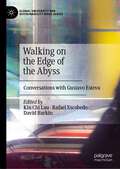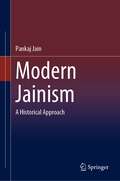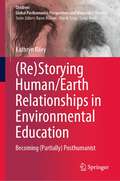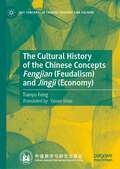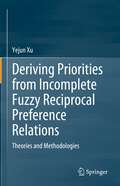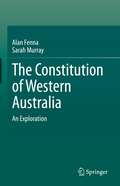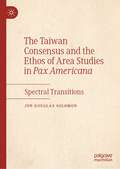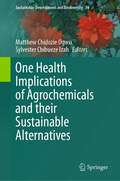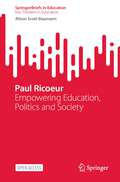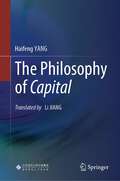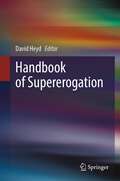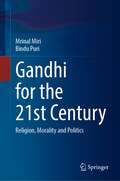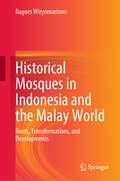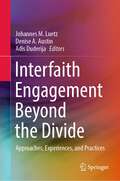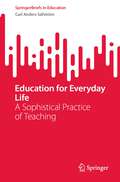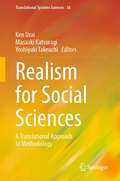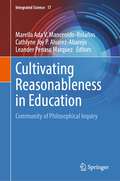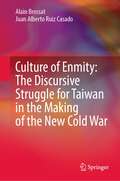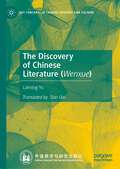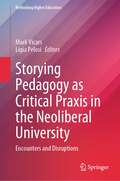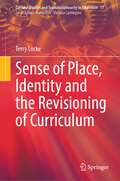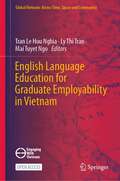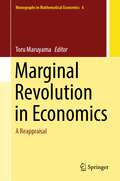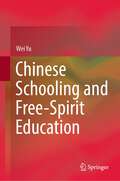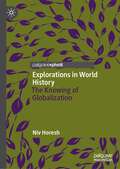- Table View
- List View
Walking on the Edge of the Abyss: Conversations with Gustavo Esteva (Global University for Sustainability Book Series)
by Kin Chi Lau Rafael Escobedo David BarkinThe book is a collection of essays written by Gustavo Esteva over the last 20 years. In this book, Gustavo Esteva, renowned in Mexico as a philosopher on education and on developmentalism, collects four major areas of his writings: on learning, development, autonomy, and interculturality. A memorial to a great thinker, this book stimulates thoughts on developmentalism across the global south.
Modern Jainism: A Historical Approach
by Pankaj JainThis book presents a substantive yet accessible introduction to the modern thought of Jainism. It examines the life and thought of some of the most influential 19th and 20th-century Jain ascetic leaders that remain little known in the Western world. The book's first part provides a detailed philosophical overview of Jain thought based on the translation of a seminal Hindi text Jain Darshan. The second part introduces eight Jain saints from the major Jain sects, including their biographies, philosophical perspectives, and related contemporary movements flourishing in various places across India and beyond. The author also shares his ethnographic experiences in several chapters. Furthermore the book provides a detailed glossary of terms in Sanskrit, Prakrit, Hindi, Gujarati, and Rajasthani and their English meanings. An indispensable book that offers innovative insights into several crucial Jain movements and how they helped shape modern Indian society and beyond. The book includes historical, philological, and anthropological accounts of modern Jainism.
**Missing**: Becoming (Partially) Posthumanist (Children: Global Posthumanist Perspectives and Materialist Theories)
by Kathryn RileyThis book is situated in the simultaneous thinking (theory) and doing (action) of posthumanist performativity and new materialist methodologies to bring forth a multitude of stories that demonstrate co-constituted and co-implicated worldmaking practices.It is written in response to the fact that our Earth is at a critical juncture. As atmospheric temperatures rise and cast unprecedented and wide-spread social and ecological crises across the planet, social and ecological injustices and threats cannot be separated from globalising, neoliberal, capitalist, and colonial discourses that proliferate through anthropocentric and humancentric logics. Manifesting in binary classifications that position the human as separate from the Earth, and dominant categories of the human in hierarchies of power, such logics homogenise and institutionalise the field of environmental education and result in an over-emphasis on instrumentalist, technicist, and mechanistic teaching and learning practices.Exploring the affects emerging within, and between, an assemblage comprising Researcher/Teacher/Environmental Education Worldings, this book seeks to understand how the researcher makes sense of herself with/in the broader ecologies of the world; collaborative processes with an elementary-school teacher in Saskatchewan, Canada, as actualised through four co-created and co-implemented multisensory researcher/teacher enactments (Mindful Walking, Mapping Worlds, Eco-art Installation, and Photographic Encounters); and how the researcher/teacher organises themselves with Land-based pedagogies, environmental education curriculum policy, and wider discourses of Western education. This book does not propose a better way of teaching and learning in environmental education. Rather, showing how difference between categories is relationally bound, this book offers a conceptual (re)storying of human/Earth relationships in environmental education for social and ecological justice in these times of the Anthropocene.
The Cultural History of the Chinese Concepts Fengjian (Key Concepts in Chinese Thought and Culture)
by Tianyu FengThis book interprets the typical Chinese concepts of fengjian (feudalism) and jingji (economy) by reviewing the mistranslation and mismatching of concepts from ancient to modern times and from a Western language to Chinese and exploring Chinese and Western acculturation, which is in line with Mr. Chen Yinque’s theory—”To interpret a Chinese character is to write a history of culture”. In the coordinates of time and space for the transformation of Chinese concepts from ancient to modern times and their translation from Western languages, this book explores the generation and evolution of Chinese concepts; using the semantic window of Chinese characters, the book reviews the historical and cultural connotations of the semantic changes and the history of the long-lasting culture of Chinese characters. This volume moves from reviewing the semantic changes of fengjian and jingji to elaborating concepts of thought; it makes the study of the history of terms and concepts the study of the history of culture and thought; it analyzes words as part of cultural history to welcome the era of cultural and historical research with a focus on words.This book is both scholarly and readable, satisfying both the academic needs of specialized researchers and the cultural curiosity of those with secondary education or above.
Deriving Priorities from Incomplete Fuzzy Reciprocal Preference Relations: Theories and Methodologies
by Yejun XuAs we know, multiplicative preference relations (or called pairwise comparisons in AHP) were proposed by Dr. Thomas L Saaty. One important work is to derive its priority from pairwise comparisons. It has been proposed many methods to derive priority for multiplicative preference relation. On the basis of fuzzy sets, the fuzzy reciprocal preference relation is proposed and is extended to the incomplete contexts. However, how to derive the priorities from incomplete fuzzy reciprocal preference relations is an interesting and challenging work. This book systematically presents the theories and methodologies for deriving priorities from incomplete fuzzy reciprocal preference relations. This book can be divided into three parts. In the first part, this book introduces the basic concepts of fuzzy reciprocal preference relations and incomplete fuzzy reciprocal preference relations. Then, two consistencies of complete fuzzy reciprocal preference relations are introduced: additive consistency and multiplicative consistency. Then, the relationships between the fuzzy reciprocal elements and the weights are showed. Afterward, in the second part, different priority methods are presented. The inconsistency repairing procedures are also proposed. Last, the priority method for incomplete hesitant fuzzy reciprocal preference relations is presented. This book can be used as a reference for researchers in the areas of management science, information science, systems engineering, operations research, and other relevant fields. It can also be employed as a textbook for upper-level undergraduate students and graduate students.
The Constitution of Western Australia: An Exploration
by Alan Fenna Sarah MurrayThis book provides the first comprehensive introduction to, and enquiry into, the rules of Western Australia’s (WA) system of government. The WA Constitution is not well known or understood ― or even easy to identify ― and this book provides an essential guide. It brings academic expertise and careful scholarship to the exploration of sometimes complex constitutional issues in a way that will be invaluable for those with specialist interest in constitutional law and government while also being engaging and accessible for a wider audience. In doing so, it combines authorial expertise from constitutional law and political science — something essential to a well-rounded understanding of the simultaneously legal and political nature of a Constitution.
The Taiwan Consensus and the Ethos of Area Studies in Pax Americana: Spectral Transitions
by Jon Douglas SolomonThis book constitutes a timely intervention into debates over the status of Taiwan, at a moment when discussions of democracy and autocracy, imperialism and agency, unipolarity and multipolarity, dominate the intellectual agenda of the day. Pursuing a parallel trajectory that is both epistemic and historical, that is traced out in relation both to Taiwan’s recent history and to the disparate forms of knowledge production about that history, this work engages in scholarly debate about some of the burning issues of our time, including transitional justice, hegemony and conspiracy in the digital age, debt regimes, cultural difference, national language, and the traumatic legacies of war, colonialism, anticommunism, antiblackness, and neoliberalism. Providing trenchant analyses of the fundamental bipolarity that persists amidst both unipolar and multipolar conceptions of the world schema inherited from the colonial-imperial modernity, this book will be of interest to scholars in many fields, including translation studies, postcolonial studies, Marxism studies, trauma studies, media studies, poststructural theory, gender studies, cold war studies, area studies, American studies, black studies, and so forth.
One Health Implications of Agrochemicals and their Sustainable Alternatives (Sustainable Development and Biodiversity #34)
by Matthew Chidozie Ogwu Sylvester Chibueze IzahThis book focuses on the United Nations SDG 3, SDG 12, and SDG 15. The book covers the full range of issues associated with agrochemical use from a One Health standpoint to promote a cleaner and safer alternative that leaves little to no negative legacy on Earth’s natural, social, and economic systems. The main focus of the book is to address the biodiversity and human health, food security, and socio-environmental implications of agrochemical use in food production. It deals with the need to move away from the use of harmful chemicals in agriculture. The threat to key aspects of One Health will be used as evidence in support of the need to transition to safer and cleaner food production systems as well as the social, economic, health, and environmental viability of sustainable alternatives. One Health is the innovative convergence approach that encourages collaborative, cross-sectoral, and transdisciplinary methods to monitor, assess, report, and implement shared human health, biodiversity, and environmental challenges and goals such as agrochemical use. Conventional agrochemicals are chemicals used to protect plants, improve crop yield and manage agricultural fields but also have a negative legacy on Earth’s systems. This book is of interest and useful to agricultural trainees and trainers, soil, food and agricultural institutes, food and soil systems specialists, biodiversity and environmental managers, activists, practitioners, and students. It is also a useful read for conservationists and industries interested in promoting organic agriculture for a sustainable community, regional and global development.
Paul Ricoeur: Empowering Education, Politics and Society (SpringerBriefs in Education)
by Alison Scott-BaumannThis open access book employs Paul Ricoeur's methodologies to identify, challenge, and replace with responsible language the many continuing abuses of power, including in the university curriculum and in the international discourse of right-wing populism. Using Ricoeur’s philosophy, the book provides a meta-frame for current debates about the university and a pragmatic micro-frame for supporting staff and students to develop important conversations on campus. It introduces the Community of Inquiry approach and describes its use to engage with complex ideas on which society has recently become silent. By contrasting Ricoeur’s work on Algeria and his work in Chicago, USA, .a bias blind spot is revealed in his desire for dialectical balance and reciprocity. This prevented him (and for some years the author) from accepting the connections between colonialism, slavery and racism and the urgent need for reparative justice. With Ricoeur, the readers can think differently: how to recognize and tackle racism and the democratic deficit, how to reduce epistemic injustice by learning how to speak out, how to move away from forced polarities and develop a pedagogy of hope as well as an acceptance of provisionality and the intractability of certain existential problems.
The Philosophy of Capital
by Haifeng YANGThis book attempts to reveal Karl Marx’s philosophical critique of the social being in capitalist societies from the text of Capital. Marxists’ different understandings of Capital in different historical periods reveal the rich meaning of Capital, which plays an important role in promoting Marxian philosophy. These different modes of interpretation also mean that the understanding of Capital is endless, because re-reading of Capital will always open up a new realm for the interpretation of Marxian philosophy. Since the financial crisis in 2008, Capital has once again become a hot topic in academic fields. However, in these new interpretations, there is no fundamental breakthrough in the illustration of Marx’s thought, because some either stick to the discussions in pure economic fields, some the revision of Marx’s manuscripts from the perspective of literature compilation, others the role of Engels’ edition. The popularity of Capital mainly stays in a certain emotion and in the internal requirements of critical reflection on capitalist society.
Handbook of Supererogation
by David HeydSupererogation is the category of moral actions which go beyond the call of duty. This collection of articles is the first of its kind to cover the broad spectrum of issues related to supererogation. It provides an up-to-date status of the discussion on the main issues, alternative analyses, and controversies regarding central cases of supererogation. The work explores a broad range of philosophical problems and challenges our presuppositions about the basis of ethical theories. Beyond the challenges of supererogation to deontological and utilitarian views, this book presents the latest developments in the way virtue ethics approaches supererogation. It also discusses the issue of whether there is a negative analogue to the supererogatory: the suberogatory. The Handbook consists also of the first systematic discussion of supererogation from the point of view of five religions as well as a feminist analysis of the concept. The book is an essential read for philosophy scholars interested in moral philosophy.
Gandhi for the 21st Century: Religion, Morality and Politics
by Mrinal Miri Bindu PuriThis book examines the centrality of ideas such as satya (truth), ahimsa (non-violence), humility, and respect for understanding moral life in the complex milieu of human existence. It provides a comprehensive view of how Gandhian ideas have both a temporal and spatial universality significantly different from Western modern philosophy's universality claims. The chapters represent different styles of philosophy but with a common purpose, offering insights into how the global debates on religion, morality, and politics are assessed from Gandhi's point of view. Written in language accessible to general readers with an interest in Gandhian thinking, the book will appeal to academics and philosophers.
Historical Mosques in Indonesia and the Malay World: Roots, Transformations, and Developments
by Bagoes WiryomartonoThe book is an interdisciplinary study on the relationship between Muslims and their mosques in Indonesia and Malaysia. It presents selected historic mosques that demonstrate local interpretations and sociocultural assimilation, as well as a geographical syncretism, of Islam in local societies. The book unveils the contestations, synchronizations, assimilations, and integrations of local and foreign elements into the contextual architecture and sociologically institutionalized system that is the mosque: the Islamic place of worship. The author excavates the mosque’s historical origins and traces the iconic elements, features, and designs from their earliest historical settings and contexts. He then identifies, analyzes, and theorizes the outcomes of the interaction between Islam and local traditions through Malaysian and Indonesian case studies. The book proposes that Islam, at its philosophical level, can be culturally acceptable anywhere because it contains universal virtues of humanity for equality, fraternity, and social justice. The book unfolds how a dialectical contestation and acculturation of Dutch colonialism, Middle Eastern elements of culture, and local customs and traditions, might then come into dialogue, peacefully. Finally, the book considers the relationship between Malay and Indonesian architecture within their respective political cultures, shedding light on Islam and its practice within rich multicultural contexts. Relevant to students and researchers in Islamic studies, architecture, and Southeast Asian studies more broadly, the book uncovers the issues, constraints, and opportunities relating to the meaning of mosques for Muslims in Malaysia and Indonesia.
Interfaith Engagement Beyond the Divide: Approaches, Experiences, and Practices
by Johannes M. Luetz Denise A. Austin Adis DuderijaThis book features reflections by scholars and practitioners from diverse religious traditions. It posits that the global challenges facing humanity today can only be mastered if humans from diverse faith traditions can meaningfully collaborate in support of human rights, reconciliation, sustainability, justice, and peace. Seeking to redress common distortions of religious mis- and dis-information, the book aims to construct interreligious common ground ‘beyond the divide’.Organised into three main sections, the book features sixteen conceptual, empirical, and practice-informed chapters that explore spirituality across faiths and cultures. Chapter 1 delineates the state of the art in relation to interfaith engagement, Chapters 2–8 advance theoretical research, Chapters 9–12 discuss empirical perspectives, and Chapters 13–16 showcase field projects and recount stories and lived experiences.Comprising works by scholars, professionals, and practitioners from around the globe, Interfaith Engagement Beyond the Divide: Approaches, Experiences, and Practices is an interdisciplinary publication on interreligious thought and engagement:Assembles a curated collection of chapters from numerous countries and diverse religious traditions;Addresses interfaith scholarship and praxis from a range of interdisciplinary perspectives;Comprises interfaith dialogue and collaborative research involving authors of different faiths;Envisions prospects for peace, interreligious harmony in diversity, and a world that may be equitably and enduringly shared.The appraisal of present and future challenges and opportunities, framed within a context of public policy and praxis, makes this interdisciplinary publication a useful tool for teaching, research, and policy development. Chapter 16 is available open access under a Creative Commons Attribution 4.0 International License via link.springer.com.
Education for Everyday Life: A Sophistical Practice of Teaching (SpringerBriefs in Education)
by Carl Anders SäfströmThis book examines the role of teaching within public education. It critiques its function in today's educational policies and theories and establishes an alternative way of understanding teaching. It explores teaching from within a Sophist tradition of educational practice and thought.The first part of the book discusses the vital link between public education and democracy, the shifts in schooling's role in fostering competition and comparisons at the cost of social responsibility and democratisation. It identifies the driving force of those shifts as forces of aggression and destruction, central to a neoliberal ideology. The second part of the book argues for a practice of Sophistical teaching rather than Socratic teaching. It explores in-depth what it could mean to be teaching in an up-to-date sophist tradition of educational thought and practice.The book also includes insights for teaching to counter aggressive forces of nationalism, racism, and late capitalism's violence and the escalating climate crisis. Readers will be able to understand teaching within educational thought and precisely how different teaching forms can contribute to education as democratisation.
Realism for Social Sciences: A Translational Approach to Methodology (Translational Systems Sciences #36)
by Ken Urai Masaaki Katsuragi Yoshiyuki TakeuchiThis book discusses the growing interest in realism in social sciences of the twenty-first century. The first part of this book provides recent discussions on realism in philosophy. The second part describes specific problems that have returned to realism in various fields of the social sciences, such as economics, cultural anthropology, management science, and statistics. This book clarifies what kinds of movements are taking place and consequently the direction in which the social sciences are heading in the future. Readers would also find that there is great diversity in the way realism and reality are perceived and understood, depending on the objectives and circumstances of each field of social science. This suggests that rather than having a unified view (stance) of realism and reality, it may be more meaningful to value the differences, diversity, and range itself. Therefore, this book does not present a unified view of realism, reality, and actuality. Although the definitions of realism and reality may differ from chapter to chapter, this represents a corner of the current state of the social sciences. This book is unique in that it examines how the issues of realism and reality are viewed, understood, and dealt with in the various fields of social science, instead of examining them by philosophers and philosophers of science. This would clarify how philosophical discussions have been translated into the various fields of social science.
Cultivating Reasonableness in Education: Community of Philosophical Inquiry (Integrated Science #17)
by Marella Ada V. Mancenido-Bolaños Cathlyne Joy P. Alvarez-Abarejo Leander Penaso MarquezThis book focuses on the real-world application of the Philosophy for/with Children (P4wC) pedagogy to cultivate reasonableness in individuals through communities of philosophical inquiry. It presents a collection not only of theories but, more importantly, of experiences, discoveries, and innovations on P4wC by scholars, trainers, advocates, and practitioners around the world. Each chapter provides readers with insights and lessons that have resulted from the continuous application, exploration, and enrichment of the concepts, principles, and practices that were developed by Matthew Lipman and Ann Margaret Sharp into what P4wC is today - a dialogic pedagogical approach that may just be what is needed at a time when reasonableness and dialogue are essential to maintaining global stability and progress. In this light, this book also looks into how the P4wC approach can be practiced with adults such as when it is employed in various settings or contexts such as in business consulting, textbook writing, peace education, and extremism prevention, among others. Furthermore, this book also features chapters that discuss how the P4wC pedagogy can be beneficial once integrated into processes such as classroom teaching, teacher education, bioethics, and employee education. This book provides valuable insights about how reasonableness that is cultivated through building communities of philosophical inquiry in education can be a powerful tool for nation-building and social transformation.
Culture of Enmity: The Discursive Struggle for Taiwan in the Making of the New Cold War
by Alain Brossat Juan Alberto Ruiz CasadoThis book provides a thought-provoking analysis of the perception of China as a formidable threat amidst the current era of socio-political polarization and growing militarization. By exploring the discursive strategies and tactics employed to cultivate antagonism, it unveils the “culture of enmity” that fosters fear and distrust towards China, both in Taiwan and beyond. Drawing on interdisciplinary research, the book delves into the ontological characteristics of such a culture and provides insights into the Taiwan conflict as a crucial observation post for understanding the intricate discursive dynamics of the New Cold War. The geopolitical situation of Taiwan presents a predicament as it finds itself at the crossroads of two conflicting realms. On one hand, it is deeply intertwined with Chinese culture and history, with the added dimension of its strategic proximity to China at a time when the latter aspires to become a regional hegemon. On the other hand, Taiwan boasts a Western-influenced political system, Western-leaning strategic alliances, and a distinct political identity forged over the past few decades. It is within this intricate interplay of apparently dissonant but overlapping factors that the thorny and challenging nature of the discursive struggle for Taiwan becomes apparent. The book consists of a collection of articles initially created by the authors during their research in Taiwan over several years, first at National Yang Ming Chiao Tung University and then at National Cheng Kung University. The articles, organized into different chapters, cover various disciplines such as political philosophy, geopolitics, history, discourse analysis, and anthropology, reflecting the diverse educational backgrounds of the authors. Despite their diversity, all chapters are deeply connected to the discursive struggle over Taiwan. Ultimately, by offering a nuanced perspective that challenges prevailing narratives, the authors provide a deliberately controversial yet refreshing viewpoint that advocates for a policy of empathy and negotiation. Such approach goes beyond mere dialogue and diplomacy, emphasizing the need for coexistence and peaceful living among different “worlds”.
The Discovery of Chinese Literature (Key Concepts in Chinese Thought and Culture)
by Laiming YuThis book traces the origin and evolvement of two Chinese characters “wenxue”(literature) by using the methods of conceptual history and historical and cultural semantics, and by taking the evolution and changes of the concept of the these two characters and their interpretations in the west as a window, and re-examining the contemporary morphology of concept evolution in the historical context of concept generation and development to discover the historical and cultural connotations hidden behind the characters, so as to embark on a vivid journey to explore the history of literary thought, discipline and culture. The entire book is woven with the concept of “literature” at its core. Following the author's analysis and interpretation, an interlocking and orderly network of description of ancient and modern, Chinese and foreign unfolds. In this context, the chapters are progressive and mutually responsive, forming an organic whole which is connected at the beginning and the end. For those readers who are trying to understand how Chinese “wenxue” evolved from one of the “four disciplines of Confucius” into a modern discipline and concept, this book will provide the most detailed, in-depth, and vivid historical picture.
Storying Pedagogy as Critical Praxis in the Neoliberal University: Encounters and Disruptions (Rethinking Higher Education)
by Mark Vicars Ligia PelosiThis book examines how teaching and learning and teacher and student identities are being reframed in higher education by neoliberal policies and practices. It shares how teachers perform teaching and learning duties in relation to prescribed institutional policies and how teachers insert dissonant pedagogies as a critical practice.The book explores narrative pedagogy as a disruptive presence and a space for critique. It interrogates personal/professional experience of educational systems that present educators juggling complexity and meeting competing demands to make learning meaningful for students. Each contribution will act as a counterpoint and provide a synoptic method for comparison. The book re-constructs meaning from the generic narrative of the public face of education, which homogenizes and diminishes collective understandings of teachers and teaching. This book provides a contemporary account of the social realities experienced within the higher education classroom across the globe.
Sense of Place, Identity and the Revisioning of Curriculum (Cultural Studies and Transdisciplinarity in Education #17)
by Terry LockeThis book explores intersections between sense of place, the formation of identity, indigeneity and colonisation, literature and literary study, the arts, and a revisioned school curriculum for the Anthropocene. Underpinning the book is a conviction that sense of place is central to the fostering of the change of heart required to secure the survival of human life on earth. It offers a coherent overview of seemingly disparate realities on a geographically and historically sprawling canvas. The book is a work of literary non-fiction, drawing on a range of sources: literary works and criticism, theoretical research, empirical studies and artworks. Of its very nature, the book enacts an extensive cultural critique. After establishing a cross-disciplinary foundation for “sense of place”, the book describes its relationship to identity with reference to such terms as attachment, dispossession, reclamation and representation. It shows how a hopeful narrative for planet stewardship can be developed by the uptake of indigenous and traditional discourses of place. It concludes with the envisioning of a place-conscious curriculum, and ways in which an activist agenda might be pursued in the Anthropocene.
English Language Education for Graduate Employability in Vietnam (Global Vietnam: Across Time, Space and Community)
by Tran Le Huu Nghia Ly Thi Tran Mai Tuyet NgoThis open access book examines the teaching and learning of English for employability in Vietnamese higher education. Its content is framed within one country to better examine the research issues within the influence of contextual factors. This book investigates how English can contribute to the development of students' employability capitals, particularly in the aspects of human capital, social capital, cultural capital, identity capital, and psychological capital. It presents employers' and employees’ perspectives of how and why English is increasingly important for career development. This book is a collection of discussions and viewpoints from teachers, students, and other stakeholders like employers, graduates, and course coordinators on current practices and their proposed improvements to prepare students for their future education, work and life. Based on empirical evidence, this book calls for repositioning English language education within the employability agenda to elevate its status and increase stakeholders' engagement. This book contributes to current debates on advancing the effectiveness of English language education in non-English speaking countries, as a response to internationalization and globalization.
Marginal Revolution in Economics: A Reappraisal (Monographs in Mathematical Economics #6)
by Toru MaruyamaThis volume is devoted to a reappraisal of the Marginal Revolution on the occasion of its 150th anniversary. The year 1871 should be remembered as one of the most important turning points in the history of economics. W. S. Jevons, C. Menger, and L. Walras published epochal works at the very beginning of the 1870s. Although these works were written independently, they shared a common mathematical structure based on classical analysis. For this reason, the emergence of the trio is called the Marginal Revolution. Indeed, 1871 is the starting point of modern economics in the proper sense. In 1971, several academic conferences were held on the occasion of the 100th anniversary of the Revolution, which exerted the stimulating influence upon the historical researches into the Revolution. Now more than fifty years have passed since then. Economic theory has experienced further substantial changes in researchers’ central interest, the way of reasonings and the styles of description during this period. In view of the new achievements acquired in recent fifty years, it seems an indispensable task for us to review and reevaluate the Marginal Revolution based upon the present status of economics.We also keep in mind that some concepts and doctrines once discarded could reappear in a later stage of history in a more or less transfigured form. The introductory chapter will be a guide for readers not only from the economics community but also from the mathematics community.
Chinese Schooling and Free-Spirit Education
by Wei YuReaching deep into the wealth of Chinese philosophical wisdom, this book offers rich insights into a way of educating that has found staunch advocates among educators through the ages. The ‘free-spirit education’, which calls on educators to respect and nurture the natural goodness of each child, affords an educational principle that is embedded in one of the most important Confucian classics: The Doctrine of the Mean. This book analyzes the meaning, history, principles, and educational application of ‘free-spirit education’ and also explores its contemporary development in the context of a school improvement initiative. It introduces the intellectual origins of ‘free-spirit education’, the application in ’process-based inductive teaching’ and cases from the field. It presents the collection of pedagogical cases that are rooted in the traditions of Chinese philosophic inquiry and viewed through the lens of contemporary pedagogy for human development. This book is a useful reference for university faculty, educational researchers, school teachers and leaders, graduate and undergraduate students in curriculum studies and in philosophy, social science, and education, curriculum developers, and all those educators who are interested in understanding ‘free-spirit education’—a key component of the humanistic traditions of Chinese education.
Explorations in World History: The Knowing of Globalization
by Niv HoreshThis book provides an analysis of the latest research findings in the field of world history, and includes terse articulations of modernity vis-à-vis empire. In doing so, the author brings together insights from both the disciplines of history and international relations into world systems, emphasising economic aspects, and offering a road map for the evolution of the field of world history.The book achieves this by critically analysing the works of Peter Fibiger Bang, Christopher Alan Bayly, Walter Scheidel, Krishnan Kumar, Xin Fan, Christopher A. Ford and Diego Olstein. The author includes discussions such as how the Roman empire impacted all subsequent Western empires, both early and modern, and current debates in world history and politics such as China’s rise.
